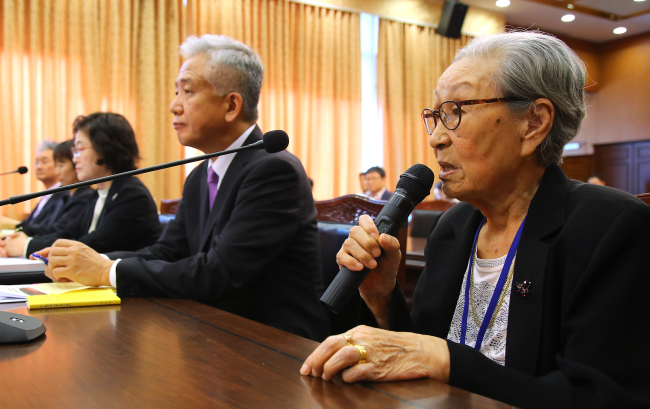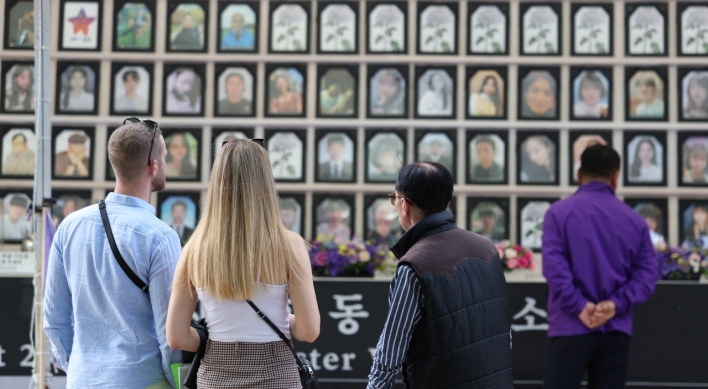After a round of raucous debate, dozens of top diplomats, lawmakers and their aides bated their breath as Kim Bok-dong, a victim of Japan’s sex slavery during World War II, took the stand to tell about the most appalling chapter of her life of 90 years at a parliamentary audit Monday.
At age 14, the daughter of a rural farmer was taken by the Japanese, who faced her family with the choice of sending her to a military uniform plant or property confiscation and eventual deportation. Days later, Kim would find herself at a frontline brothel in Guangdong province, China, before being dragged around Hong Kong, Malaysia, Indonesia and Singapore over the next eight years, she said.
“They told me I was 22 years old when I returned home after Japan was defeated, I didn’t even know how many years had passed,” Kim said, looking frail, yet with a vigorous voice.
“I had done everything to make a living in Busan and then found other women to fight to vent our spite together. That’s how we’ve come all the way for the last 25 years, setting up a memorial with the help of women’s groups and ordinary citizens and doing many other things to get our voices heard, and the only thing I want now is an apology.”
At age 14, the daughter of a rural farmer was taken by the Japanese, who faced her family with the choice of sending her to a military uniform plant or property confiscation and eventual deportation. Days later, Kim would find herself at a frontline brothel in Guangdong province, China, before being dragged around Hong Kong, Malaysia, Indonesia and Singapore over the next eight years, she said.
“They told me I was 22 years old when I returned home after Japan was defeated, I didn’t even know how many years had passed,” Kim said, looking frail, yet with a vigorous voice.
“I had done everything to make a living in Busan and then found other women to fight to vent our spite together. That’s how we’ve come all the way for the last 25 years, setting up a memorial with the help of women’s groups and ordinary citizens and doing many other things to get our voices heard, and the only thing I want now is an apology.”

With the ruling Saenuri Party’s absence, the session turned into a venue for intense debate over last December’s agreement on the sex slavery rows with Japan.
To Kim, so the settlement failed to meet her demand. She refuses to accept any portion of the 1 billion yen ($9.95 million) provided under the deal, in favor of Japanese Prime Minister Shinzo Abe directly conceding to and atoning for legal responsibility for the atrocities’ forcefulness before the victims.
“We can never accept it, never,” she said. “The government made a mistake taking the money. Now I rather want the government to hand off this issues. ... We will continue our fight together with the people.”
Sitting beside her was Lee Sang-deok, who led the negotiations as director-general for Northeast Asian affairs at the Foreign Ministry here and who currently serves as Seoul’s ambassador to Singapore.
He reiterated that the funds had a “symbolic meaning” in line with the Japanese government’s acknowledgement of state responsibility for the sex slavery and the premier’s apology.
But lawmakers took issue with a clause in the agreement that Seoul will work to “properly resolve through consultations with related organizations” the status of the statue established in front of the Japanese embassy.
Foreign Minister Yun Byung-se was also met with lawmakers’ calls to clarify the nature of the money -- whether it means compensation or what officials call “healing funds.”
“The section literally gives legitimacy for Japan to demand the memorial be taken down,” said Rep. Lee Tae-kyu of the minor opposition People’s Party, referring to an ongoing series of news reports out of Japan on the memorial’s possible removal. “This virtually promises that our government will resolve the issue.”
Lee reaffirmed the existing position that the issue is that of “private domain,” though he admitted the article carried the government’s willingness to “make possible efforts to help realize Japan’s wishes.”
By Shin Hyon-hee (heeshin@heraldcorp.com)







![[Music in drama] Rekindle a love that slipped through your fingers](http://res.heraldm.com/phpwas/restmb_idxmake.php?idx=644&simg=/content/image/2024/05/01/20240501050484_0.jpg&u=20240501151646)


![[New faces of Assembly] Architect behind ‘audacious initiative’ believes in denuclearized North Korea](http://res.heraldm.com/phpwas/restmb_idxmake.php?idx=644&simg=/content/image/2024/05/01/20240501050627_0.jpg&u=20240502093000)







